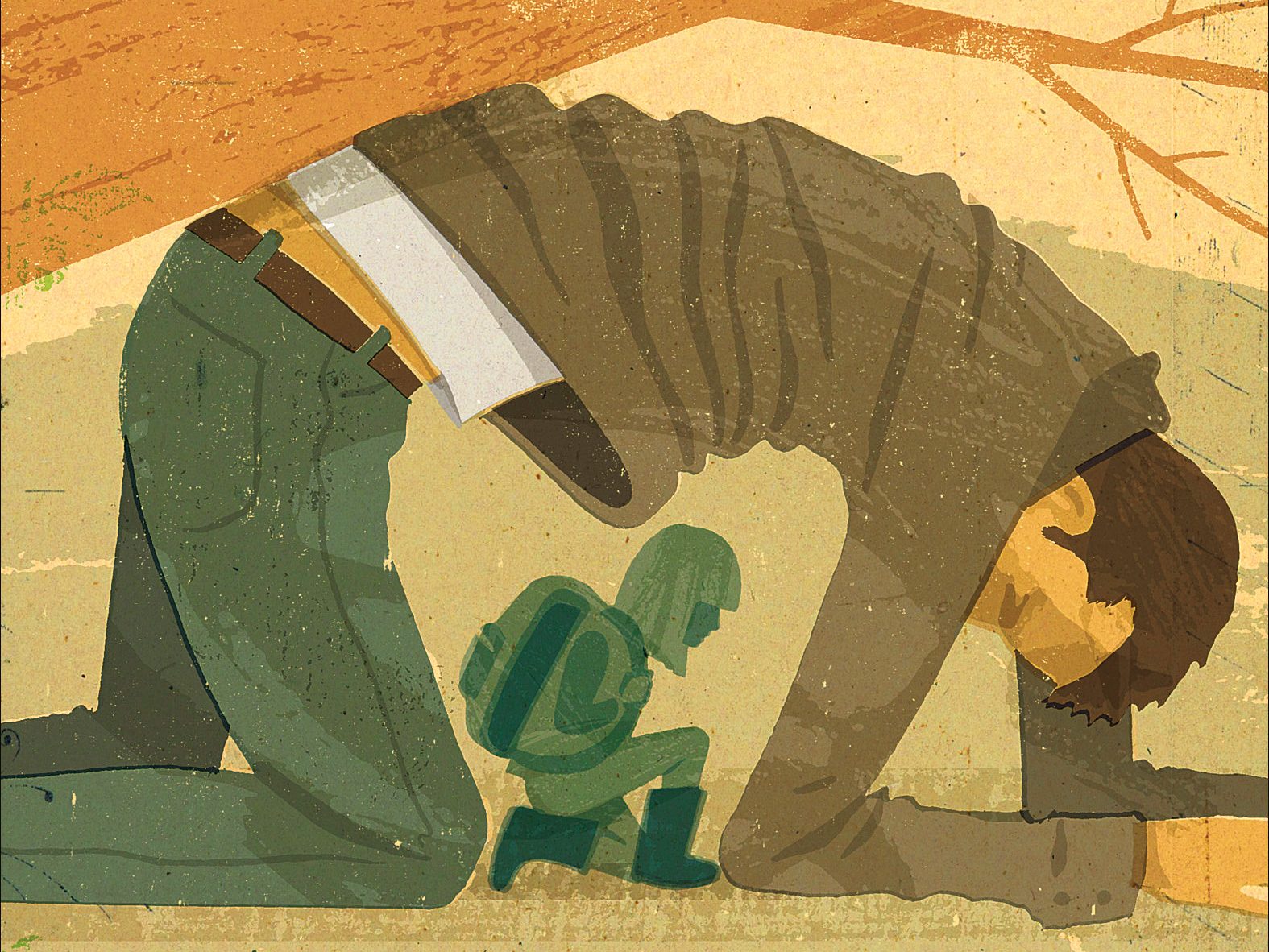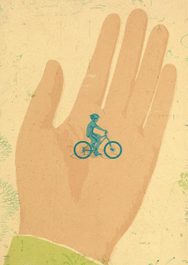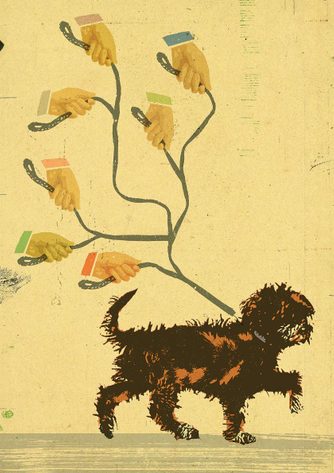
The Shield
With falling trees threatening a group of schoolchildren, a bystander rushed into the fray.
Nick Karol slammed on the brakes. In front of him, across Bornite Mountain Road, lay a hemlock 50 metres long and as thick as two cinder blocks. The 32-year-old fishing guide climbed out of his truck and walked up to the large tree, scratching his beard. How was he going to get home? As he stood there, a yellow school bus stopped on the other side of the trunk, 30 metres from him.
It was getting dark and the wind was picking up. Terrace, B.C., is a former logging town, a loose collection of houses shelved on the northern side of a heavily forested valley. Four years ago, a storm knocked down bunches of hemlock and cedar, leaving many more loosened in their beds. A new batch snapped every time a gale hit the area. Karol stared at the bus and grew nervous about the blustery air. “All I could think was, Don’t you dare let those kids off,” he says.
At the same moment, Rachel Côté looked out the window. She saw her neighbour Karol standing in front of her house, beside a downed tree, and further out, the bus that dropped off her five grandkids, ranging in age from five to 17, every day at 4 p.m. At 68, Côté had lived in the valley most of her life and knew how quickly weather conditions could change-trees were now swaying so severely the tops were nearly touching the ground. The bus door opened and the kids ran for home. All five bolted but only made it about three metres before trees began crashing down, ripping out from their roots, soil flying through the air.
Côté rushed out just as Karol began to wave his hands, yelling at the kids to get back on the bus. They stopped, a cluster of brightly coloured jackets frozen in confusion, and then began to turn when three hemlocks smashed into the bus-still carrying 14 kids-and barred the door. The wind now sounded like a jet engine. Trapped, Côté’s grandchildren started to scream. Karol yelled at them to run for home again. They all did, except seven-year-old Felicity, the shyest of the clan. She was curled up in the middle of the road, hands over her head.
Racing, Karol scrambled over the hemlock and scooped her in his arms. He spun around and then heard a deafening crack. “I just braced,” he says. A cedar tore through a power line and slammed into his back. Karol gasped but managed to keep the heavy tree off the little girl. More trees followed, dropping on either side of them. Karol rushed forward, shielding Felicity with his body. “It was like the whole forest was collapsing,” he says. He climbed over and ducked under trees, zigzagging through an obstacle course of branches, trunks and power lines.
Côté was on her front deck, having gathered the rest of the kids, all unharmed. Karol carried Felicity toward her. “Everything happened so quickly that it wasn’t until I saw them appear out of the downed trees that I realized how close I came to losing her,” Côté says. “My little girl would have been crushed had Nick not risked his own life.” Karol put Felicity down and they ran to the safety of the deck. The wind had quieted. Wincing from the bad bruises along his upper body and arm, he watched the bus-battered, but intact-wait for the police. He could hear sirens in the distance.
– By Ryan Stuart

Substitute Teachings
We bought our son, Seth, a bike at the end of June for his Grade 6 graduation. Seth had never owned a new bike before. Unfortunately, the second day he took it to school, someone cut the lock and stole it. I posted an ad on Kijiji with the story and asked for information. A couple emailed, saying they wanted the chance to give our son back the thing that was taken from him. Putting aside our pride, my wife and I accepted their offer.
Under the pretense of sizing him for used models we might buy in the future, we took Seth to the bike store. He tried a few, told us his preference and was preparing to leave when the couple-young, mid-20s-appeared beside him with an envelope to help cover the bicycle he wanted. “We just want you to know,” they told him, “that there are people who do nice things as opposed to steal.” We thanked them profusely and they walked away, leaving behind a stunned 12-year-old and two parents who now have a little more faith in human kindness.
– As told to Samantha Rideout by Don Woligroski, 41, Winnipeg

A Dog’s Life
Rescued from the streets of Sarajevo, a stray inspires a chain reaction of generosity.
All pointy bones and scruffy fur, she’s stooped over a filthy puddle, considering a drink. After two days in Sarajevo, Bosnia and Herzegovina, in June, my fiancée and I are used to the strays. But this one’s just a puppy, and there’s something about her, equal parts timid and sweet, with striking orange-and-black patterning and patches of white on her nose and paws. “Should we take her?” Shannon asks.
“We’re driving across Europe. We definitely shouldn’t take her,” I say. But two days later, she ambles toward us, flopping beside our café table near where we first saw her, in the old quarter. Shannon kneels beside the puppy. She’s never been able to say no to a dog, and I’ve never been able to say no to Shannon. The puppy’s ours. We name her Sara, after the city.
We don’t expect much help in this war-haunted place of cold shoulders, but from the moment I tuck Sara under an arm and Shannon raises a hand to flag a taxi, it’s all we find. With a glance at the trembling puppy, the cab driver suspects the dog is ill. He refuses the full fare and, cigarette dangling from his mouth, races us to a nearby animal clinic. The veterinarian swoons over Sara and turns down payment for the battery of tests that reveals what we were afraid of: she might be dying.
Sara has canine distemper, an incurable virus that’s attacking her nervous system. The vet administers some antibiotics to combat the onset of possibly fatal secondary infections, like pneumonia, but the clinic can’t keep her while the medicine kicks in, and we’ll be touring around Europe for the next three weeks. A woman in the waiting room interjects. She’s an animal rights rep for the United Nations, and she knows a guy who knows a guy.
The next morning, in the vet’s parking lot, we meet a long-haired, thick-armed horse racer. Within seconds, the giant is cooing to the sick puppy in Bosnian. While we’re away in Hungary, Austria and Switzerland, his two English-speaking boys dutifully text daily updates (“The puppy is better today!”). He accepts only a pittance when we finally retrieve her.
Sara joins us in our tiny VW Polo as we leave the Balkans. In Slovenia, a pimply grocery clerk searches for 10 minutes to find her the perfect cardboard box. Later that day, a limping hotel owner brings his own family’s bedding to make Sara more comfortable. In Austria, a perky pet-shop employee won’t let us leave until we walk out with toys she knows Sara will love. The kindness works. Sara eats, she runs, she develops a hatred of pigeons, to the delight of passersby.
And though the kindness stops working, it doesn’t end. One week later, in Berlin, Sara’s seizures start. The only animal clinic open on Sundays sends us to emergency. The vet on duty promises to visit Sara as soon as she can, but we decide to put Sara down a few hours later. The disease had penetrated her brain. Back at our hotel, Shannon and I cry together for the first time in our one-year relationship.
In the morning, we return to the clinic, seeking confirmation that our difficult choice had been correct. Our vet is out, but before we can leave, her colleague-clean-shaven, clean-cut, the consummate German-barks at us to come back. As staff stare, he pulls us into a long hug. He’s heard about Sara and wants to tell us we gave her everything we could. His embrace is the final kindness. With Sara in our lives, we understood how much was beyond our control. When we admitted as much to strangers, we received an unexpected gift: generosity.
– By Drew Gough
Angel Investment
The phone rang. “I’d like to drop off a bank draft,” said a man’s voice in a robotic monotone. “Will you be around in the next 20 minutes?” I said yes.
The call wasn’t a surprise. Twelve years ago, I was diagnosed with systemic scleroderma, an autoimmune disorder that tricks my body into overproducing collagen, causing my skin and internal organs to harden. Basically, I’m turning to stone. I’ve been able to buy some time with immunosuppressants and steroids, but the disease has sped up, and my doctors are working hard to stave off lung fibrosis, which leads to heart failure.
Last year, I learned about an experimental procedure in Chicago, with an 80 per cent success rate, that can remove my stem cells, purify them and graft them back into my body to grow a clean, new immune system. My four kids started fundraising in June to cover, in part, the $125,000 cost of the treatment. I assumed the caller, who phoned on July 3, had read about our website in the local paper and wanted to give a donation.
Ten minutes later, a middle-aged man knocked at my door. He was tall and slender and wore a white golfer’s cap, big sunglasses and a grey spring coat zipped up to his neck. He handed me a long white envelope. I said, “God bless you.” He didn’t utter a word. He just smiled and walked away. I closed the door and opened the envelope. The number on the draft made no sense-I was sure I was reading it wrong: $128,000. I fell down, and the crash brought my mom running. When she got there, I shouted, “Oh, my God, oh, my God.” We held each other, crying and screaming.
Who was he? Friends ask if I think he was an actor or a hockey player. I didn’t get the feeling he was famous. But it doesn’t matter. Here’s what matters: in January, I’ll be in Chicago for the three-month procedure. Whoever that man was, he saved my life.
– As told to Carmine Starnino by Stephanie Headley, 48, Kanata, Ont.
Roadside Assistance
On March 22, I was driving to say the blessing at a Cape Breton University student banquet when I heard a large bang. I stopped the car, and a small truck pulled up beside me. The driver pressed his hands together to indicate I had a flat. I stepped out and explained that I was a nun and was headed to an important function. He asked, “What time do you have to be there?” I told him 6 p.m. It was already 5:30, and I still had a 10-minute drive. “I’ll have the tire changed in less than 15 minutes,” he said.
True to his word, the man worked quickly. When he finished, I asked him for his name and address so I could send him a thank-you card. “You don’t owe me anything,” he said. “This isn’t the first tire I’ve changed, and it won’t be the last.” I made it to the meal in time and said a quiet thanks to him during opening grace.
– As told to Samantha Rideout by Sr. Catherine MacFarlane, Eskasoni, N.S.